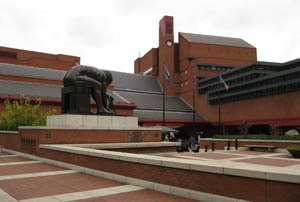 Do you ever do that? Deliberately put yourself in line of hearing other people's conversations? My wife and I are terrible offenders, if indeed it is an offence. We know intuitively when there is a situation, a possibility, to observe and hear life and people unedited, which can yield such fascinating results. Let me relate an experience we had recently.
Do you ever do that? Deliberately put yourself in line of hearing other people's conversations? My wife and I are terrible offenders, if indeed it is an offence. We know intuitively when there is a situation, a possibility, to observe and hear life and people unedited, which can yield such fascinating results. Let me relate an experience we had recently.
We were visiting a place that we did not know at all, the new British Library near Saint Pancras Station in north London. (It was new to us because it opened in the '90s just as we were leaving for the States.) A real treasure, the Library doesn't look anything like a gem when you first see it, more like one of those Soviet mausoleums that we used to see on TV as the backdrop for May Day marches. But don't be off put by its appearance because there is beauty here, which validates architect Colin St John Wilson's assertion that "the meaning lies in its use." He has produced a building that really works internally.
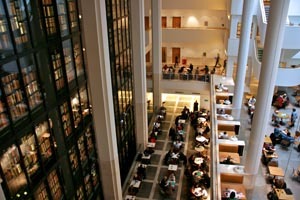 You enter and there is space. Tons of it. Very high ceilings and this monumental six-story bronze and glass tower that confronts you the moment you try and get your bearings. It contains the King's Library, 65,000 books acquired by King George III and later given to his son the Prince Regent later to become George IV. It is magnificent and the signature image for the whole building. Today the Library is the biggest in the world, which surprised me to discover as the Americans always make that claim for everything ever built. The collection includes the Magna Carta, (which I must say is a pretty untidy piece of work for something of such historic importance) along with the Papal Bull that annulled it almost instantly. The latter is a much better produced document although less democratic for sure (they just had more stylish scribes in Rome at that time.) There's Nelson Mandela's trial speech; Da Vinci's Notebook; the original Penny Black postage stamp of 1840 which you can just pull out of a wall for a really close up view; Jane Austen's writing table with a prim and proper copy of Persuasion in her own very neat hand contrasted with Ian Fleming's The Living Daylights the handwriting of which is perfectly dreadful.
You enter and there is space. Tons of it. Very high ceilings and this monumental six-story bronze and glass tower that confronts you the moment you try and get your bearings. It contains the King's Library, 65,000 books acquired by King George III and later given to his son the Prince Regent later to become George IV. It is magnificent and the signature image for the whole building. Today the Library is the biggest in the world, which surprised me to discover as the Americans always make that claim for everything ever built. The collection includes the Magna Carta, (which I must say is a pretty untidy piece of work for something of such historic importance) along with the Papal Bull that annulled it almost instantly. The latter is a much better produced document although less democratic for sure (they just had more stylish scribes in Rome at that time.) There's Nelson Mandela's trial speech; Da Vinci's Notebook; the original Penny Black postage stamp of 1840 which you can just pull out of a wall for a really close up view; Jane Austen's writing table with a prim and proper copy of Persuasion in her own very neat hand contrasted with Ian Fleming's The Living Daylights the handwriting of which is perfectly dreadful. 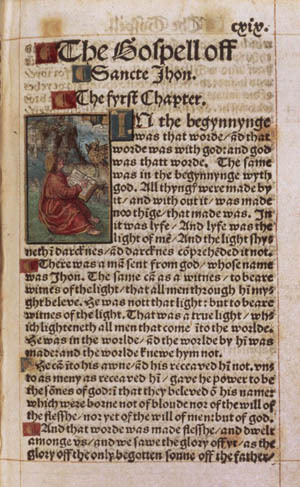 And for me that great example of courage and tragedy, Tyndale's Bible (in photo right), which led him to be tried and then burnt at the stake during the reign of Henry VIII for heresy, his offence being to translate the Bible from Latin into English, which obviously offended the Church's regime of "authority, miracles and mystery," just as Dostoyevsky's Grand Inquisitor would have said.
And for me that great example of courage and tragedy, Tyndale's Bible (in photo right), which led him to be tried and then burnt at the stake during the reign of Henry VIII for heresy, his offence being to translate the Bible from Latin into English, which obviously offended the Church's regime of "authority, miracles and mystery," just as Dostoyevsky's Grand Inquisitor would have said.
And I am only just skimming the surface of what the Library has on offer. It is heaven for the scholar and it is a paradise for every thinking living human being curious about our world and our great heritage. And it's all free.........
So forgive the circuitous introduction, but it is relevant because on the day we visited the Library, there were streams and hordes of school kids being given every chance to develop their intellectual capacity and understanding of the world. And it was the kids' response to the place that suddenly captured our intense interest.
The encounter happened in front of a large glass case. We found ourselves looking at an ancient and most beautifully illuminated version of the Quran displayed in its own case and open to a particular page. A group of children aged about 8 years old came over with their teacher to take a look and she asked them in a squeaky high voice:
"So who knows what this is?"
"It is the Quran," said a young boy of medium height wearing a heavy coat.
"And how do you know that?"
"Because I read it every day."
At which point this particularly stupid teacher (that was my immediate assessment at least) just sort of walked off, leaving this boy with two of his friends.
His friends said, "Why do you want to be a Muslim then?"
"I am a Muslim" said in the most dignified and quiet way.
"But your religion is sick," and they said this almost by rote, certainly unthinkingly. It was a default comment and it was not meant to cause harm.
"But I am a Muslim."
"Sick, sick, sick," they said as they wandered off trying to find their teacher, I imagine, leaving this very brave, noble young soul looking at the Quran.
What came into our view almost immediately then was a group of eighth graders, all young men of colour who had just come from the audio section and were singing of all things, the "Hallelujah Chorus" from Handel's Messiah. They weren't sending it up; in fact they were singing it with gusto, with good intonation and with some delight. They found their teacher, a bright, youthful 40-something dressed in a kaftan who was obviously taking great delight in his students' rendition. It was all so accepting, so understanding, seeing the beauty in Handel whilst at the same time experiencing the beauty in the Muslim faith because they too looked with some interest at the illuminated Quran. This inspired a spousal discussion about the power of teachers to influence and provide messaging, but the message to us was without doubt heartening and hopeful.
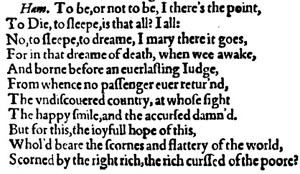 Then we wandered into "Shakespeare in 10 Acts", commemorating the 400th anniversary of the Bard's death with an exhibition celebrating his enormous influence. It was fascinating. Among the highlights, we saw some sketches, in what is purported to be Will's own hand, of a play that came to nothing based on the life of Sir Thomas More. Also the Folio from 1623 of his complete works, produced seven years after his death and at great expense by his close friends including Ben Jonson. We are in their debt as they preserved virtually everything that now sustains our experience of Shakespeare. Best of all, there was the original Quarto (a kind of cheap paper-back version of some of the plays) from 1603. It was open to what was apparently Shakespeare's first go at Hamlet. So just try this for truly terrible writing:
Then we wandered into "Shakespeare in 10 Acts", commemorating the 400th anniversary of the Bard's death with an exhibition celebrating his enormous influence. It was fascinating. Among the highlights, we saw some sketches, in what is purported to be Will's own hand, of a play that came to nothing based on the life of Sir Thomas More. Also the Folio from 1623 of his complete works, produced seven years after his death and at great expense by his close friends including Ben Jonson. We are in their debt as they preserved virtually everything that now sustains our experience of Shakespeare. Best of all, there was the original Quarto (a kind of cheap paper-back version of some of the plays) from 1603. It was open to what was apparently Shakespeare's first go at Hamlet. So just try this for truly terrible writing:
To be, or not to be, I there's the point,
To Die, to sleepe, is that all? I all:
No, to sleepe, to dreame, I mary there it goes,
For in that dreame of death, when wee awake,
And borne before an euerlasting Iudge,
From whence no passenger euer retur'nd,
The vndiscouered country, at whose sight
The happy smile, and the accursed damn'd.
But for this, the ioyfull hope of this,
Whol'd beare the scornes and flattery of the world,
Scorned by the right rich, the rich curssed of the poore?
The widow being oppressed, the orphan wrong'd,
The taste of hunger, or a tirants raigne,
And thousand more calamities besides,
To grunt and sweate vnder this weary life,
When that he may his full Quietus make,
With a bare bodkin, who would this indure,
But for a hope of something after death?
Which pusles the braine, and doth confound the sence,
Which makes vs rather beare those euilles we haue,
Than flie to others that we know not of.
I that, O this conscience makes cowardes of vs all,
Lady in thy orizons, be all my sinnes remembred.
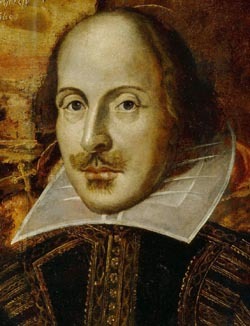 It's so terrible because we know how good it was to become. Maybe, just maybe, we should not have been overhearing him as he tried to get this one just right.
It's so terrible because we know how good it was to become. Maybe, just maybe, we should not have been overhearing him as he tried to get this one just right.
It made me wonder what Will would have made of our contemporary maelstrom, our ability to be tolerant and, in turn, murderous of ideas and peoples, our sense of beauty and reverence for our culture contrasted with our promotion of extremism and destruction for other cultures. His intuitive analysis of the human psyche would perhaps have recognized a few more contradictions and paradoxes over the last 400 years. And if he were with us now might have inspired another great tragedy or perhaps even a comedy.